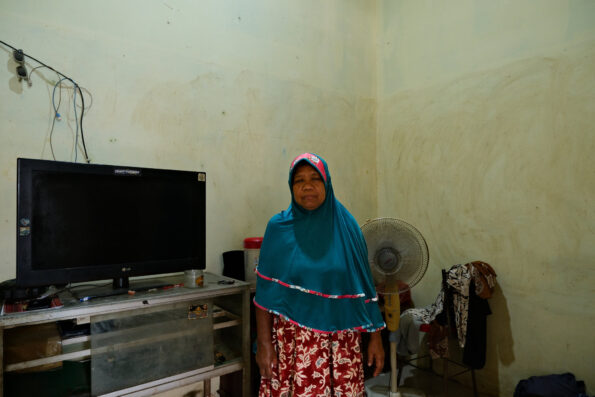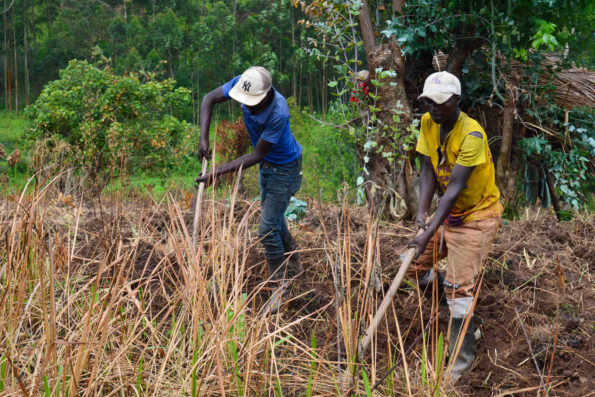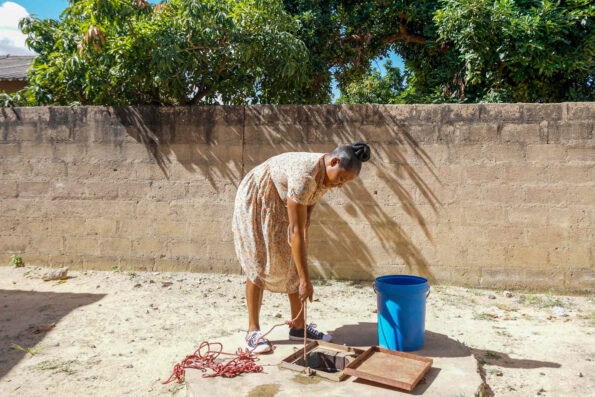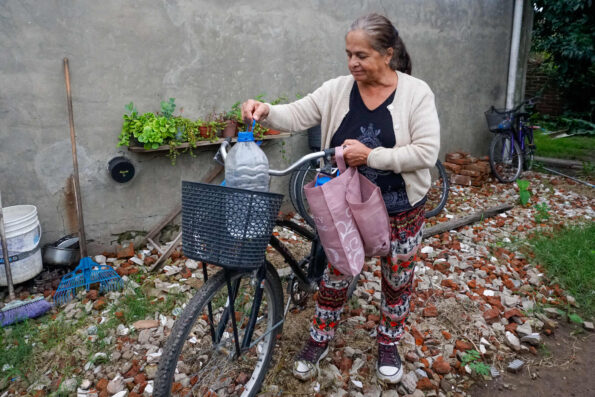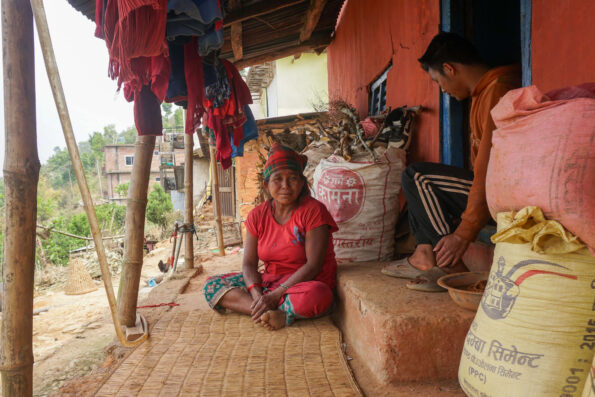
Merveille Kavira Luneghe, GPJ DRC
Charles Kasereka, in red, and Richard Kakome saw through a tree on a hill in Lubero territory. DRC is grappling with increasing deforestation.
KATWA, DEMOCRATIC REPUBLIC OF CONGO — On a routine afternoon last December, a half-dozen loggers in Katwa, a village in Lubero territory in eastern DRC, swung and sang in the forest as nearby herders guarded sheep and goats. Chainsaws brayed. Axes chopped. Trees thudded to the ground.
The loggers stacked the timber, which will end up as charcoal, planks and firewood. On the surface, they are just making a living. But as they denude this forest, they’re also speeding up climate change and hobbling farmers and others whose livelihoods are tied to the weather.
It is a scene repeated throughout this vast country. Once known as “the second lung of the planet” for its massive rainforests, DRC finds itself increasingly devastated by deforestation.
Farmer Kasereka Kopokopo, 38, says the changing climate in and around Katwa has erased once-predictable growing seasons. This has blunted crop production, which in turn has driven up food prices. His land used to produce 100 kilograms (220 pounds) of beans each season. Now, it yields 30 kilograms (66 pounds).
“The lengthening of both wet and dry seasons has created a lot of confusion,” says the father of five. “We don’t know when planting season is anymore.”
Forests blanket nearly 50% of DRC. The continent’s most biologically diverse country, DRC also holds more than half of Africa’s tropical forest land. These forests are home to 1,150 species of birds, as well as more than 3,200 types of animals that can only be found in DRC – from okapi (a relative of the giraffe) to bonobos (a type of chimpanzee).



But deforestation has surged over the past 25 years. The country’s forests shrank by more than 300,000 hectares (1,158 square miles) per year, and that figure is rising, according to a report by the nonprofit International Tropical Timber Technical Association.
Wildfires and slash-and-burn farming are among the culprits, along with charcoal production, cattle-raising, and small-scale – often illegal – logging.
Twenty years ago, Lubero territory, in North Kivu province, was known for its forests and woodlands. Farms and fields have replaced some of those areas, while some sections of forest are now studded with row after row of tree stumps.
Small-scale loggers invaded the area, and timber prices shot up from $2 to $5 to between $10 and $100. This drew even more loggers. And the more timber’s value climbed, the more trees in the forest fell.
Deforestation ensued, which meant trees were no longer around to absorb carbon dioxide, a greenhouse gas known as a major contributor to climate change. Emissions of greenhouse gases grew over the past decade as deforestation went virtually unchecked, despite DRC’s regulations, says ecologist Kasereka Wasakundi.
Deforestation may account for as much as 70% of the disruption of DRC’s growing seasons, Wasakundi says.
Muhindo Lule Matthieu, mayor of the commune of Kirumba, just outside Katwa, says he repeatedly warns locals – especially loggers – of the dangers of deforestation. He tells people that if they cut down a tree, they must plant at least one to replace it.
“We can’t bear the consequences” of deforestation, Matthieu says. “Many people don’t understand, but we don’t tire of raising their awareness.”
The wet seasons used to run from February to March and August to October, agronomist Kakule Kwiravusa Jérémie says. “They can now be very dry months. There is no distinction between the wet and the dry seasons anymore.”
Bean and corn crops have suffered the most. Marceline Kavira, 37, grows beans, cassava and apples. She says she used to grow 45 kilograms (100 pounds) of beans per season, but in each of the last two years, she harvested only 6 kilograms (13 pounds).
This means consumers pay more for staples. Muhindo Mboghoto Ezéchias, 30, a schoolteacher, says 1.5 kilograms (3.3 pounds) of beans used to run 600 Congolese francs (30 cents). Now they cost between 1,500 francs (75 cents) and 2,500 francs ($1.26), “depending on the whims of the seasons.”



Loggers, meanwhile, are ambivalent. A former farmer, Musubaho Wandavakuti, 37, says logging allows him to provide for his wife and four children. But it comes at a price.
“We think [logging] is beneficial,” he says. “We make a living from charcoal, planks and firewood. This is our life.”
Nonetheless, he adds, “the felling of trees may lead us to desertification, lack of air to breathe and loss of vegetation and animals.”
Kopokopo owns nearly a half-hectare in Katwa, although he has additional fields elsewhere, where he grows other crops such as cassava. That allows him to stay in farming. Even so, he says, he and other farmers feel helpless.
“We need the help of agronomists to learn how to adjust to the disruption of growing seasons,” he says, “before the situation gets even worse.”
Merveille Kavira Luneghe is a Global Press Journal reporter based in Kirumba, Democratic Republic of Congo. Merveille specializes in migration and human rights reporting.
Translation Note
Emeline Berg, GPJ, translated this story from French.

